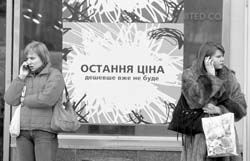A telephone call on Ukrtelekom

Among the main factors that will have impact on the economy next year will be the government’s ability to attract more investments, says Valeriy Heiets, chairman of the board of the National Bank of Ukraine. He says that the current year passed “according to investment passivity.” This determined the low GDP rate in 2005, which will affect the Ukrainian economy in 2006.
Heiets’s opinion is markedly different from the official one. The government believes that the truly unique sale of Kryvorizhstal has substantially improved the situation; there are signs that the government will keep selling giant industrial projects next year, thus resolving all investment and budget problems in one fell swoop. The Verkhovna Rada’s special privatization oversight commission recently studied the privatization of the monopolist Ukrtelekom public corporation in which the state has a 92.86 percent interest. But after examining the cabinet’s bill “On Changes to and Nullification of Certain Legislative Acts Relating to the Privatization of the Public Corporation Ukrtelekom” (Nov. 23, 2005), the commission recommended that the Ukrainian parliament reject it, and that the government should draft and submit a separate bill concerning the specifics of the Ukrtelekom privatization project.
According to the law on the specific features of the Ukrtelekom privatization, suspended in early July, there were plans to sell the investor 42.86 percent of the shares, with the buyer controlling another 25 percent of the 50 + 1 percent interest held by the state. The remaining shares (7.14 percent) were sold earlier to the “working collective.” The tender was scheduled for August 2004, but President Kuchma instructed the cabinet and the State Property Fund to suspend the privatization because of election campaign speculations.
President Yushchenko supports the speedy privatization of Ukrtelekom. Earlier, the government adopted measures to increase the monopolist communications company’s starting price; the company was issued a third-generation mobile communications license without having to compete with any other market operators. Transport and Communications Minister Viktor Bondar noted that the government proposes a separate 2006 budget bill item granting Ukrtelekom this third-generation mobile communications license on the terms that were valid until recently, without holding an auction, which will raise the operator’s capitalization. If the Verkhovna Rada approves, Ukrtelekom will pay some 140-150 million hryvnias for the license, in keeping with tariffs valid until recently, and the rest of the licenses will be issued on a competitive basis, said the minister. In a word, the company is preparing for privatization in accordance with the rules that were condemned just a short while ago. However, Prime Minister Yuriy Yekhanurov stated recently that the government has practically drawn up a list of privatizable businesses for the year 2006, and that Ukrtelekom is among them, adding, “We further propose to enhance the transparency of the Ukrtelekom sales, for which purpose we have submitted a pertinent bill to the Verkhovna Rada.”
We know that parliament will most likely vote down the bill. That’s nothing new. Today, like under Kuchma, the pre-campaign situation does not favor sales of such big companies. Once they start discussing such sales, speculations begin. A recent example is the statement by the deputy head of the Batkivshchyna Party Mykhailo Brodsky, who believes that selling Ukrtelekom before the election is inadmissible and says that the government’s attempt to sell the company’s 42 percent share as “hidden corruption.” According to this BYuT functionary, Serhiy Liovochkin, the former head of the oversight council of Ukrtelekom and a close associate of Kuchma’s, and Oleksandr Tretiakov, the current head of this council and disgraced former first assistant to the president, are interested in the sale of Ukrtelekom. Brodsky added that they are trying to sell Ukrtelekom to a certain individual. Whether this is true remains to be determined by a court of law.
It is clear, however, that the privatization of Ukrtelekom should not be hurried. The Ukrainian parliament is likely to adopt this strategy. Mykhailo Chechetov, former head of the State Property Fund, told The Day that “before the elections any “untoward moves” regarding any serious businesses should be avoided.” Ukraine must be aware that by putting Ukrtelekom up for sale, it is placing the company into the hands of a foreign investor. Chechetov stressed the need to enact a law on the depth of foreign capital penetration (he said such laws exist in many countries), for the point here is that this is a basic industry that has a direct impact on Ukrainian national security. Another option would be to include a clause allowing domestic investors to bid in the Ukrtelekom auction.
Newspaper output №:
№41, (2005)Section
Economy





